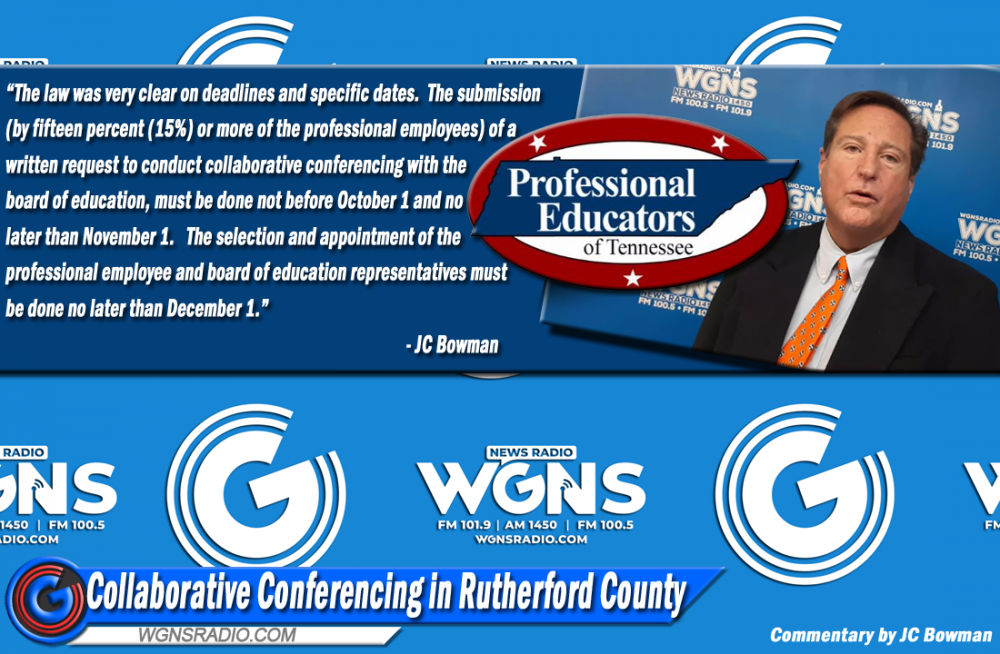(RUTHERFORD COUNTY, TN) COMMENTARY: Seemingly every year across the state “collaborative conferencing” gets debated by stakeholders and policymakers. In Rutherford County schools, this issue is now being debated by educators. The initial training in the principles and techniques of interest-based collaborative problem-solving used in collaborative conferencing was initially to be developed by the Tennessee Organization of School Superintendents (TOSS) in conjunction with representative organizations of school leaders and administrators and professional employees' organizations.
The Tennessee School Boards Association (TSBA) subsequently conducted the training in 2011. Representatives of Professional Educators of Tennessee, TOSS, TSBA, and the teacher’s union all participated in this training. A detailed report was sent to the Tennessee General Assembly on the activities of the training and participants in 2012. We haven’t really changed the process since this time.
Collaborative Conferencing is the process by which local boards of education and their professional employees meet, either directly or through representatives designated by the respective parties, to confer, consult, and discuss matters relating to certain terms and conditions of professional service as specified by the passing of the Professional Educators Collaborative Conferencing Act (PECCA). The process of collaborative conferencing includes the exchange of information, opinions, and proposals among the conferencing parties, as well as the use of the principles and techniques of interest-based collaborative problem-solving (IBCPS).
The term "interest-based collaborative problem-solving" is not defined by the new law. However, interest-based collaborative problem-solving is an increasingly popular method of multiparty consensus-building negotiation. It is based upon mutual interests and respect among the parties, jointly identifying problems, the open, free exchange of information, nurturing creativity in the generation of options, and a good-faith, non-adversarial approach to solving problems using agreed-to criteria. This is intended to lead to an agreement between the parties based on consensus and mutual gain.
In a perfect world all parties work together, and all members of the collaborative conferencing teamwork toward a common objective in unity. Professional Educators of Tennessee fervently support the right of educators to discuss working conditions and salary with their employers.
In collaborative conferencing local boards are required to address: Salaries or wages; Grievance procedures; Insurance; Fringe benefits (not to include pensions or retirement programs of the Tennessee consolidated retirement system or locally authorized early retirement incentives); Working conditions, except those working conditions that are prescribed by federal law, state law, private act, municipal charter or rules and regulations of the State Board of Education, the Department of Education or any other department or agency of state or local government; Leave; and, Payroll deductions (except with respect to those funds going to political activities).
Subjects prohibited from conferencing include: Differentiated pay plans and other incentive compensation programs, including stipends, and associated benefits that are based on professional employee performance that exceeds expectations, or that aid in hiring and retaining highly qualified teachers for hard-to-staff schools and subject areas; Expenditure of grants or awards from federal, state or local governments and foundations or other private organizations that are expressly designed for specific purposes; Evaluation of professional employees pursuant to federal or state law or State Board of Education policy; Staffing decisions and State Board of Education or local board of education policies relating to innovative educational programs under § 49-1-207; innovative high school programs under Title 49, chapter 15; virtual education programs under Title 49, chapter 16; and other programs for innovative schools or school districts that may be enacted by the general assembly; All personnel decisions concerning assignment of professional employees, including, but not limited to, filling of vacancies, assignments to specific schools, positions, professional duties, transfers within the system, layoffs, reductions in force, and recall. No agreement shall include provisions that require personnel decisions to be determined on the basis of tenure, seniority, or length of service; and payroll deductions for political activities.
The law was very clear on deadlines and specific dates. The submission (by fifteen percent (15%) or more of the professional employees) of a written request to conduct collaborative conferencing with the board of education, must be done not before October 1 and no later than November 1. The selection and appointment of the professional employee and board of education representatives must be done no later than December 1. The transmission to the board of the confidential poll results and the names and positions of the appointed representatives must be done by January 1. This is the law. If the law needs to be changed, all groups should work together through the Tennessee General Assembly to make the appropriate changes.
All educators and all professional employee organizations have the same rights under PECCA. The school board does not have to enter a Memorandum of Understanding (MOU), and the MOU should be “prepared jointly” according to the law. We would suggest that putting some of these items into Board Policy might lead to a more consistent policy and better working conditions than an MOU that would expire on a specific date. The law also mandates that any items that require funding cannot become effective “until the local funding body has approved such funding in the budget.”
The Tennessee General Assembly was clear in 2011 that they wanted to get politics out of our public schools while supporting teachers’ rights to fight for higher wages and better working conditions. The PECCA legislation made clear that directors may communicate with teachers about collaborative conferencing through any means, medium, or format the director chooses. Legislators had anticipated that increased collaboration would benefit the women and men in our classrooms with better working conditions, improved dialogue, and mutual respect thus benefitting all our students. There is still work left to do to accomplish this challenging objective.
Commentary submitted by JC Bowman. JC Bowman is the Executive Director of Professional Educators of Tennessee, a non-partisan teacher association headquartered in Nashville, Tennessee.
Tune-in to WGNS on Tuesday, December 6, 2022 at 8:10AM to hear more about this time sensitive subject. Bowman is scheduled to be an on-air guest during the WGNS Action Line this coming Tuesday to talk more about Collaborative Conferencing in Rutherford County.
Additional WGNS News Headlines:
- Shoplifting in Rutherford County - How Many Cases?
- Trash Problems in Rutherford County - Waste Transfer Station?
- State Urges Biosecurity to Prevent Highly Pathogenic Avian Influenza
- Drive-Thru Christmas Light Display in Murfreesboro (FREE)
- New Business Filings in Tennessee Highest Ever for a 3rd Quarter
- Murfreesboro Police Investigating Bank Fraud Case
- Shoplifting Incident at Old Fort Parkway Store
- Female Allegedly Held Captive for 3-Days
- Friday Tree Lighting on Historic Square
- Commentary about Keeping Up with Technology
- 39% of Tennessee Mortgages in 2021 were 3% or Under
- Local Hospital Inspired by Greenhouse Ministries and Giving Back
- Local Restaurant Featured on America’s Best Restaurants


